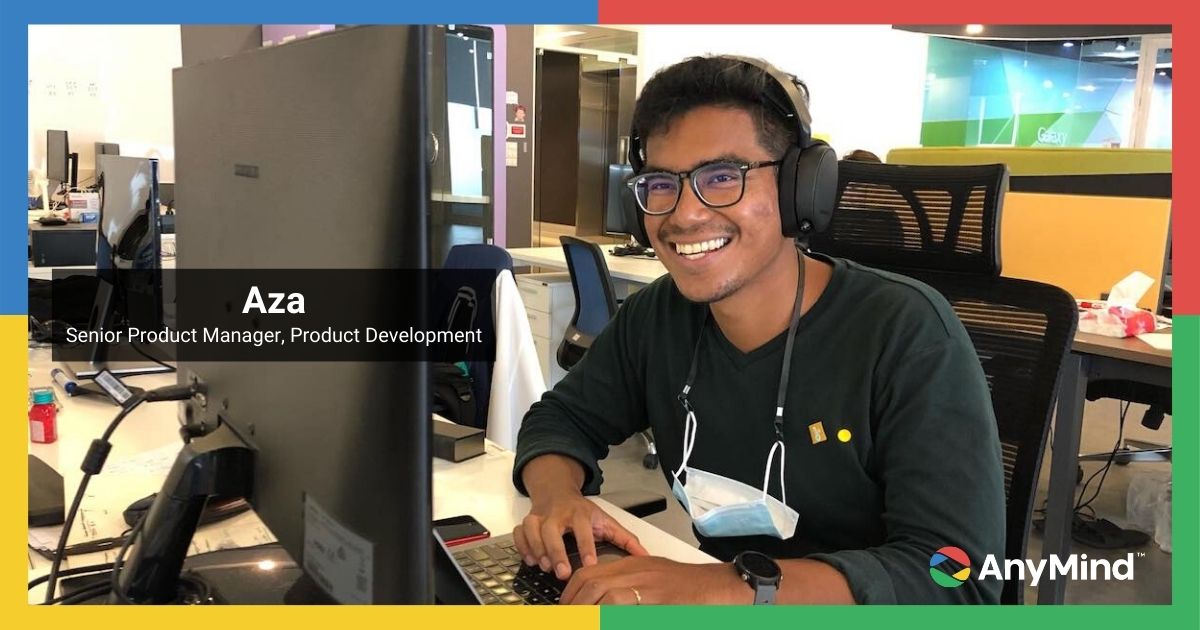For this edition of #AnyMindJourney Sessions, we speak to Aza, who is the product manager for AnyFactory, AnyMind Group’s cloud manufacturing platform. Aza shares more about his journey in the company – moving from working on AnyMind University, an internal learning platform, to working on a platform that connects users with manufacturers from around the region.
Can you give us an idea of your role? The projects I’m working on are AnyFactory (primarily) and AnyDigital, our digital marketing platform. As product manager, I work across various stakeholders in AnyMind Group and the engineering team for our products.
How’s your journey at AnyMind Group been? My journey at AnyMind has been quite diverse – I’ve been able to do many things. Previously I was able to bank on my past experience in analytics to improve business efficiencies, specifically around people training and product knowledge, which is how AnyMind University came about.
Looking at what I was doing in analytics, they (the management) thought that perhaps I have potential towards becoming a product manager to determine requirements and needs of a product. It’s definitely been a journey going from people and analytics to now product management.
One of the key areas throughout this journey was to keep an open mind. Personal agility and self-resourcefulness are also very important. You need to be motivated enough to read and learn things on your own, and also do it quickly.
I’m always learning new things, building up knowledge around technical solutions and product, and this is very beneficial towards my own personal development as well.

How’s life like in the tech team? Life in the tech team is pretty interesting because we’re a very diverse team – many different nationalities and many different backgrounds. We’re actually spread out across Thailand, Vietnam, Japan and India. Apart from the six or so teams working across our various products, we also have a data science team.
Coming back to your original question about life in the tech team, I would say that life is interesting, because we get to mingle with different cultures and different people. At the same time, it can be a demanding environment because we’re constantly pushing ourselves to try to provide the best solutions to solve certain business problems – the fastest way and the most efficient way possible with our tech solutions.
I think it’s rewarding in the sense as well that once we see something come into fruition and we launch a new feature, there’s a sense of pride from what we’ve developed, especially if it’s being used a lot by our customers and team members internally.
What are some of the ways the team keeps track of tasks and sprint cycles? Just some background, the start of this process actually comes from the business side – they might have some ideas or requirements, or some problems that we’re looking to solve, so we gather all of these things from various stakeholders, and what we do before we go into a sprint is that we craft out a roadmap of like “Ok, we’re going to solve this problem or we’re going to build this feature during this amount of time frame”.
So a typical sprint cycle here is around seven working days, and before each sprint, we’ll have a meeting to lay out and mutually agree upon the tasks that each member will take during a said period of time. We’ll also have daily standup meetings which are usually 10 to 15 minutes long, where we discuss what’s been done and will be done, and also any roadblocks which we’ll discuss as a team on how to overcome them. At the end of the sprint, we’ll also have a retrospective meeting to gather feedback from everyone; what worked, what didn’t work and what we can improve on.
What we value a lot here is open communication and honest feedback, because we need to be aligned in terms of how we’re looking to complete our tasks and if there are any problems then we can resolve them right away. Sometimes throughout this process, there can be friction between developers or team members, so within our teams, it’s very very important to build good work relationships with each other and have certain character traits – things like empathy.
I think also what’s important is that everyone needs to keep in mind the common goal that we’re here working for. Primarily it is to achieve something awesome for the company, but also that we’re developing ourselves in terms of skills and portfolio. That’s why when there is constructive feedback, team members know that it’s coming from a good place.
The fact that we’re working in these sprint cycles and we have laid out certain commitments, it’s up to the team how they manage their own time because ultimately we need to follow the overall goal and timeline of the project.
I would say though that with the current remote working situation, it’s very important that we have daily meetings and it’s also very important that each of us makes a commitment towards making ourselves available for ad hoc discussions that we might need to take throughout the day, because if we come across an issue or something that we’re not clear about, it’s important that we are able to resolve it as quickly as possible so that we can move forward.
Aza is also the star of our Thailand office tour video. Check it out below!
We’re developing various products including AnyFactory and more, and we are hiring more product managers and engineers. If you are interested, please visit the link here and select “Product Development.”
There is also a blog written by AnyMind engineers. If you’d like to check it out, please visit here: – On the AnyMind Group website: https://anymindgroup.com/news/?category=tech-blog – Japanese: https://qiita.com/organizations/anymindgroup – English: https://medium.com/anymind-group/tech-blog/home










